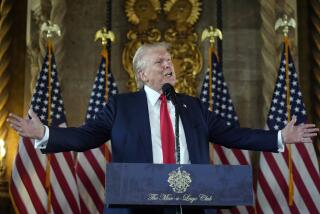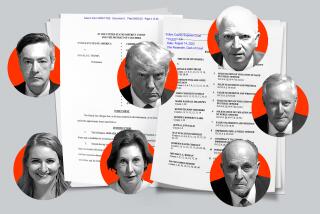Fitzgerald’s moment
- Share via
THE RULE OF LAW can be a nebulous concept, hard to define and easy to manipulate, but it was present Friday in all its majesty in a 7th-floor conference room at 950 Constitution Ave. in Washington. That’s where Special Prosecutor Patrick J. Fitzgerald explained to the nation the charges in his investigation into the leak of the identity of CIA agent Valerie Plame.
Those charges are at once disappointing and inspiring. They do not go to the heart of the matter Fitzgerald is investigating -- namely, who leaked Plame’s identity, or even whether doing so was a crime. What they do show is the rule of law working to hold officials accountable to the public they serve.
The grand jury delivered five charges against vice presidential advisor I. Lewis “Scooter” Libby, two each for perjury and making false statements and one for obstruction of justice. Libby allegedly lied to FBI agents and to the grand jury about how and when he learned that Plame, the wife of administration critic Joseph C. Wilson IV (see his article on the opposite page), worked at the CIA, and how and when he shared this information with journalists.
Fitzgerald was at his articulate best in explaining that such charges are not mere technicalities. “If Mr. Libby is proven to have done what we’ve alleged,” he said, his conviction “will vindicate the interest of the public in making sure he’s held accountable.” In a criminal case, he said, “if you find a violation, it doesn’t really, in the end, matter what statute you use if you vindicate the interest.” Fitzgerald went out of his way to emphasize that Libby is presumed innocent, mentioning it half a dozen times, and he repeatedly refused to speculate about future charges or the political implications of his work.
Those implications could hardly be more momentous. President Bush vowed to restore honor to the White House during his 2000 campaign, in a veiled reference to the Clinton-era scandals, and one of his Republican administration’s main selling points is that it can be trusted to treat national security seriously. Friday’s indictment, however, shows how the White House used Plame’s identity as part of a deliberate campaign to discredit critics of the war in Iraq. Now the administration may face the spectacle of a sitting vice president being forced to testify in the trial of his former chief of staff.
The administration is well within its legal rights, obviously, to justify its policy in Iraq. Debate about the war and its aims is as necessary as it is vicious, and obviously still relevant. But the administration has set new standards for the politicization of national security, with the vice president’s office at the center of a skillful yet reckless effort to manipulate intelligence and mislead the media.
Neither of which is necessarily against the law. Where this operation may have crossed into illegality was in the leaking of Plame’s identity. It’s clear that Fitzgerald knows who did this -- the indictment refers to a mysterious “senior official in the White House (Official A),” widely believed to be Karl Rove -- but the law requires that Fitzgerald prove intent. Libby was charged with obstruction of justice in part because he has prevented Fitzgerald from divining that intent.
So Fitzgerald’s investigation will continue. Whether he will charge other administration officials remains to be seen. Thus far, however, his investigation is a credit to both him and the public he serves.
More to Read
Get the L.A. Times Politics newsletter
Deeply reported insights into legislation, politics and policy from Sacramento, Washington and beyond. In your inbox twice per week.
You may occasionally receive promotional content from the Los Angeles Times.










